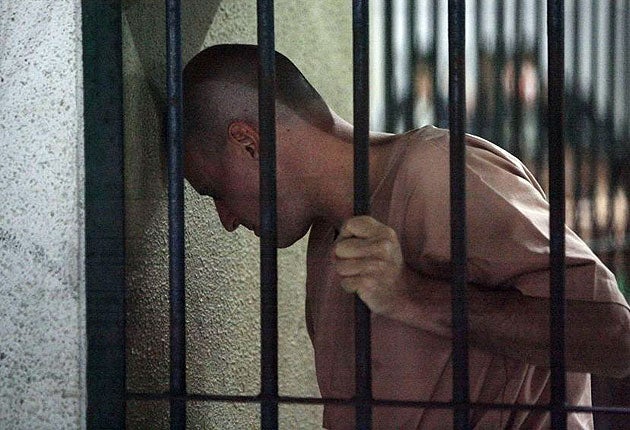Writer jailed for defaming royalty in book that sold seven copies

Your support helps us to tell the story
From reproductive rights to climate change to Big Tech, The Independent is on the ground when the story is developing. Whether it's investigating the financials of Elon Musk's pro-Trump PAC or producing our latest documentary, 'The A Word', which shines a light on the American women fighting for reproductive rights, we know how important it is to parse out the facts from the messaging.
At such a critical moment in US history, we need reporters on the ground. Your donation allows us to keep sending journalists to speak to both sides of the story.
The Independent is trusted by Americans across the entire political spectrum. And unlike many other quality news outlets, we choose not to lock Americans out of our reporting and analysis with paywalls. We believe quality journalism should be available to everyone, paid for by those who can afford it.
Your support makes all the difference.An Australian writer whose novel sold just seven copies has been jailed for three years for defaming the King of Thailand.
Harry Nicolaides, who appeared in court in leg irons and brown prison overalls, broke down and wept after the court delivered its sentence. He would have faced double the time in jail had be not pleaded guilty.
"This can't be real. It feels like a bad dream," Mr Nicolaides, from Melbourne, told reporters as he left the court yesterday. "This is an Alice in Wonderland experience. I really believe that I am going to wake up and all of you will be gone."
The case of Mr Nicolaides, of mixed Greek and Australian descent is a tale that mixes tragedy and farce. The 41-year-old was charged over his 2005 novel Verisimilitude whose sales failed to make it into double figures. According to the presiding judge at Bangkok's Central Criminal Court, a passage in the book that discussed the personal life of a fictional prince "suggested that there was abuse of royal power". Precisely what was deemed offensive is unclear; after the case, the prosecutor warned reporters that the law prohibited the repetition of the material.
Mr Nicolaides, who taught at a university in the north of Thailand and was detained when trying to leave the country, unaware of the allegation against him, has fallen foul of Thailand's "lese-majeste" laws which prohibit the publication of anything considered defamatory of the royal family and in particular 81-year-old King Bhumibol Adulyadej. Anyone saying anything considered offensive of the king, considered semi-divine, faces jail of up to 15 years.
Increasingly, however, the law has been used as a tool to silence critics of the royal family against the backdrop of Thailand's recent political turmoil. The Royal family, in particular, Queen Sirikit has been criticised for its closeness to campaigners who laid siege to parts of Bangkok city and saw two previous prime ministers forced from office. Last October, the queen attended the funeral of an anti-government protester killed during clashes with police.
Critics of the law say it is open to abuse since a complaint can be filed by anybody against anybody, no matter how minor the alleged disrespect. And even though the king himself has said he should not be above the law, police feel obliged to investigate all accusations. Earlier this month, Justice Minister Pirapan Salirathavibhaga vowed to toughen laws protecting the monarchy and crack down on criticism of the palace and a Thai man accused of insulting the monarchy in comments posted on the internet was arrested last week. Up to 2,300 websites considered critical of the royal family have been shut even though the recently elected and British-educated prime minister, Abhisit Vejjajiva said last week he was trying to "strike the balance between upholding the law and allowing freedom of expression".
Yet opinion about the Thai royal family appears mixed. Yesterday evening as the sun fell behind Bangkok's Chao Phraya River, The Independent interviewed workers heading home on the cross-river ferry. Those who gave their names universally spoke warmly of the king. "I like the King of Thailand. He is the King of Kings," beamed Kukiat Ngamwitrot, a human resources executive.
Privately people may feel a little different. One 22-year-old man who asked not to be named said he believed the royal family should keep out of politics. "Now the king and queen have joined with the politics and that is not good. The politics should be separate. The queen has been a big supporter of the protesters," he said.
Thailand's Eton-educated Prime Minister, Abhisit Vejjajiva, was elected last month following months of turmoil that had seen two prime minister of the People's Power Party (PPP) - once headed by another former prime minister Thaksin Shinawatra - forced from office by the courts. In November, protesters opposed to the rule of the PPP closed down Bangkok's airports, stranding thousands of international tourists.
Join our commenting forum
Join thought-provoking conversations, follow other Independent readers and see their replies
Comments